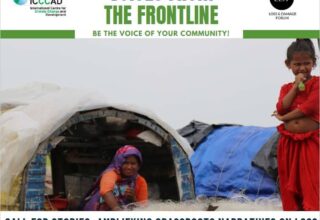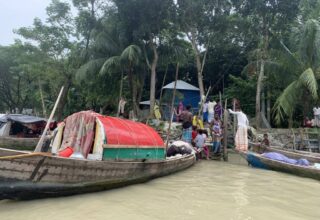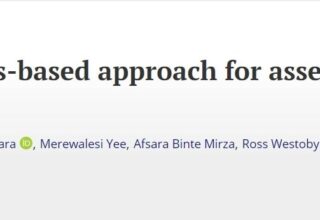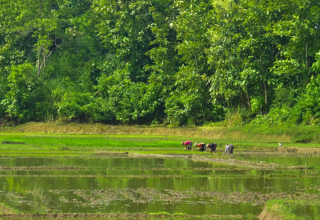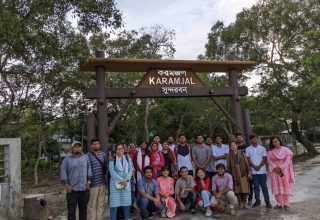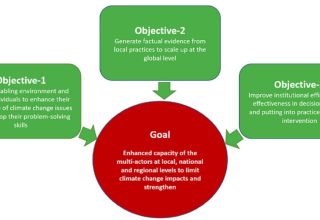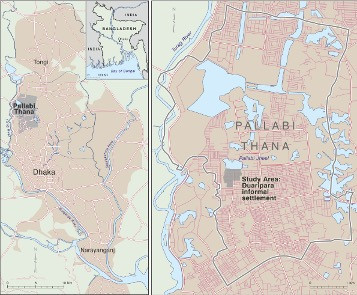
Despite loss and damage from human-induced climate change getting attention at COP26, there has been little action to avert, minimize, and address the loss and damage experienced by those bearing the brunt of climate change.
Climate change impacts everyone, but people will not all face this challenge in the same way, as its impacts are unevenly distributed. We need to make sure that the voices of those living on the front lines of climate change are heard, are listened to, and are acted on by world “leaders,” because these communities have contributed the least to climate change but are dealing with its catastrophic effects right now. They deserve more than empty words and promises.
Listening to those on the frontline
We met Rohima in May 2018 outside her house in Duaripara informal settlement in North-west Dhaka where four out of five informal dwellers experience severe heat stress and almost two out of five face severe flooding, waterlogging, or drainage congestion. But these statistics conceal real people with real lives and real losses. The stories of their daily lives on the frontline of climate change need to be heard and considered.
In 2016, Rohima’s family lost everything in the floods — her house and crops were destroyed. With their livelihood at stake, they left Hossainpur, a village in Kishoreganj district where she had lived all her life, and moved over 100 km away to live in Dhaka. Their life is very different now She told me:
“Who would have thought life would be like this? Circumstances have forced us to live this way. Lack of money is […] what worries me the most. It is very hard for us to pay the rent for even a house like this. The heat is unbearable inside in the summer, I find it difficult to sleep. […] In the monsoon season, waterlogging makes life very tough. We cannot get out. We [managed to] raise the foundation of the house, but all our efforts were in vain. Water [still] comes into the house, it brings in snakes, leeches, and other insects, it is a dangerous situation. The bed gets drenched and infested, leaving us sleepless throughout the night. We had to put bricks under the bed to somehow deal with the situation. We try to avoid getting soaked in the filthy water by spending the day on the bed that we have raised. My husband stocks up on dry food, we somehow try to manage with this.”
Despite the impacts of climate change that Rohima has experienced in Hossainpur, which has left her with no land, no shelter, and no savings, she longs to return home. Though moving to Dhaka helped her family to survive, it is unable to replace those aspects of identity and attachment — that sense of belonging, quality of life, and familial and kin connections — that are associated with her life back in Hossainpur.
“The distress does not seem to end at all […]. We have practically nothing left in our village, [but] I long for my birthplace. I would like to go back to my village and to my relatives. It would bring me peace. Sadly, I have lost my house and there is no hope for me to go back.”
We all will encounter loss and grief at some point in our lives, but rarely do we consider the intense feelings of loss of place and identity that people, like Rohima, experience in the aftermath of extreme floods — the cognitive-emotional bonds she has to Hossainpur, that makes her who she is. There is an urgent need to recognize the profound impact climate change has on psychological, symbolic, cultural, and emotional aspects of place attachment and place identities, which are often overlooked in assessments of climate impacts and risks.
But Rohima has hopes and dreams for something different, a better future:
“I have lived my life fighting poverty and now I am old and tired. Unfortunate circumstances forced us to live like this and we are somehow coping with the situation, but my grandchildren cannot. I would never want them to live like we do now. They have their whole life ahead of them. As they grow up, times will be different. I hope they live happy, healthy, and prosperous lives.”
If we are to address the urgent threat of climate change, for people like Rohima, we cannot continue with business-as-usual solutions. COP27 must hold world “leaders” to account to agree on more ambitious action to set us on a pathway towards transformational change that answers Rohima’s call for a better, more just world — where rights protect all girls, boys, and their families’ needs.
Originally this article was published on August 3, 2022 at Dhaka Tribune.
Dr Joanne Jordan is a senior climate change researcher, affiliated with the University of Manchester. She has 17+ years of experience addressing major challenges of global environmental change and sustainable development for low-income and disadvantaged groups in South-East Asia, Latin America, and in particular South Asia with multilateral and bilateral development agencies, academic institutions, non-governmental organisations, and policy research institutes. joanne.jordan@manchester.ac.uk.

